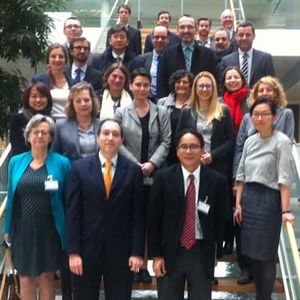Despite increasing international and European harmonization, the design of IP protection systems remains subject to the laws of individual states. The internationally accepted principle of territoriality limits the scope of application of the law to the territory of the legislating state. This also applies to cases involving intellectual property issues.
The increasing integration of the global economy and the potentially worldwide dimension of even the simplest acts of communication over the internet, have called into question the existing conflict-of-laws systems for quite some time. Especially at the start of the new millennium, this situation led to several scholarly initiatives aiming at the development of more suitable and internationally aligned principles. Among them were the so-called “CLIP Principles for Conflict of Laws in Intellectual Property”of 2011, initiated by today’s Max Planck Institute for Innovation and Competition and the Max Planck Institute for Comparative and International Private Law, which received worldwide attention. However, all these initiatives were of regional character (USA, Europe, and Asia) and they differ in several regards, such as in particular the conflict rule for initial ownership. Furthermore, they do not provide solutions for all issues that should be addressed.
International research group develops extensive guidelines
To fill these gaps the International Law Association in 2010 established the “Committee on Intellectual Property and Private International Law”. This research group, with its almost 30 experts, among them the Managing Director of the Institute, Josef Drexl, has developed the Kyoto Guidelines. The guidelines, which were adopted during the 79th Biennial Conference of the ILA in December 2020, comprise 35 model provisions. In addition to questions of applicable law, the guidelines address matters of international jurisdiction of the courts and cross-border enforcement of judgments. The scope of the guidelines is not limited to classical intellectual property rights like copyright, patent and trademark law, but can be applied to related areas such as unfair competition law and the protection of trade secrets. The final text is divided into four sections: General Provisions (Guidelines 1-2), Jurisdiction (3-18), Applicable Law (19-31), and Recognition and Enforcement of Judgments (32-35).
The Kyoto Guidelines aim to propose specific provisions to national legislatures for the design of private international law on intellectual property issues to achieve a substantively balanced and internationally coordinated system in the long term. Judicatures can now begin using the guidelines as interpretive aid if their national system allows for such interpretation. Besides well-established and widely discussed issues at the interface of intellectual property and private international law such as the determination of initial ownership and multi-state infringements, the guidelines address new phenomena like cross-border collective copyright management.
Conflict-of-laws rules for CMOs
Though cross-border activities of collective rights management organizations (CMOs) are increasingly gaining relevance, the question of conflict-of-laws rules for CMOs has hardly been discussed so far. In 2015, in the course of the implementation of the Collective Rights Management Directive of the European Union (Directive 2014/26/EU), the Institute was alone in pointing out unresolved questions of private international law; it developed principles that have now been included in the Kyoto Guidelines.
The Kyoto Guidelines were adopted by the ILA at the end of last year. The Fifth Committee Report, which is already available to the public, contains basic comments for a better understanding of the provisions. The guidelines are scheduled for publication as a book including detailed commentary later this year.
The text of the Kyoto Guidelines can be found here.

